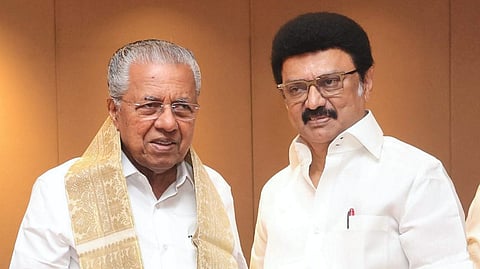

THIRUVANANTHAPURAM: Kerala Chief Minister Pinarayi Vijayan has warned that the Union Government’s proposed delimitation of parliamentary constituencies could drastically reduce the representation of southern states in Parliament, punishing them for successfully implementing population control policies.
Speaking at the Joint Action Committee (JAC) meeting in Chennai on Saturday, Vijayan warned that the delimitation process was being pushed forward without consultation and described it as a “sword of Damocles” hanging over southern states.
"The Union Government’s actions, from fiscal policies to language policies to cultural policies and now even the fixation of representation, are destabilising India’s federal system and democratic framework. This cannot be allowed to pass," he said.
Pinarayi stressed that federalism was not a privilege granted by the Union but a constitutional right of the states. "Our collective resistance is not just about seats; it is a fight to preserve India’s soul as a diverse and inclusive democracy," he said.
The chief minister alleged that the BJP-led Union Government was moving ahead with delimitation without consultation, driven by political motives rather than democratic principles.
"If delimitation is undertaken after the Census, northern states will see a large increase in seats, while southern states will face a significant reduction. This benefits the BJP, which holds greater influence in the north. If representation is determined purely by population, Kerala and other southern states will suffer, despite having responsibly controlled population growth since 1973," he said.
"Our states are now being punished precisely for our sincere implementation of the National Population Policy of 1976," he continued. "The Union Government once praised us for achieving population control targets, yet now, the same government is penalising us by reducing our political representation and financial allocations."
He noted that Kerala’s share of central tax revenues had already been reduced, citing a drop from 3.875 per cent during the 10th Finance Commission to 1.925 per cent in the 15th Finance Commission.
"Effective population control leads to increased public health spending, but while devolving funds, no special consideration is given to states that bear this financial burden," Pinarayi argued.
"If our parliamentary representation is further reduced while our share of the nation’s wealth continues to decline, we will face an unprecedented situation where both our rightful share of funds and our political voice to demand them diminish simultaneously," he said.
Kerala, Tamil Nadu, Andhra Pradesh, Telangana, Karnataka, Odisha, West Bengal, and Punjab have now united in protest. The Kerala CPM stated that this meeting, called by M.K. Stalin, marks the beginning of a coordinated resistance.
Pinarayi warned that the proposed delimitation could lead to a centralisation of power that undermines India’s federal character. "The current effort at delimitation disrupts the balance between the Union and the States, disproportionately empowering those that failed to implement national policies like population control. States that prioritised education, healthcare, and gender equity will be penalised for their progressive choices, discouraging future human development initiatives," he said.
He cited constitutional and historical precedents supporting federalism. "Dr. B.R. Ambedkar warned against the ‘tyranny of the majority’, and the Sarkaria Commission reaffirmed that federalism is not a mere administrative arrangement but a fundamental feature of the Constitution. Ignoring these principles revives colonial-era centralisation, which history has shown to be detrimental to India’s unity," he said.
Highlighting the broader impact of the proposed changes, Pinarayi emphasised that India’s strength lies in its cultural and linguistic diversity.
"Our cultural and linguistic diversities are assets that strengthen our nation. Kerala’s ‘Kudumbashree’ initiative, which empowered millions of women, and Tamil Nadu’s mid-day meal scheme, are state-led innovations that became templates for the entire country. Centralising power will stifle such localised solutions," he said.
He criticised the Union Government for failing to clarify whether the pro-rata distribution of seats would be based on the current strength of Parliament or population figures.
"The Union Government must alleviate our concerns. It is their responsibility to refrain from unilateral measures and uphold democracy and federalism," he said.
Pinarayi concluded by calling for consensus before proceeding with delimitation. "We must ensure that the delimitation exercise retains our current proportional share of parliamentary seats. This meeting lays a strong foundation for the Joint Action Committee, which will take forward our collective stand at the national level," he said.